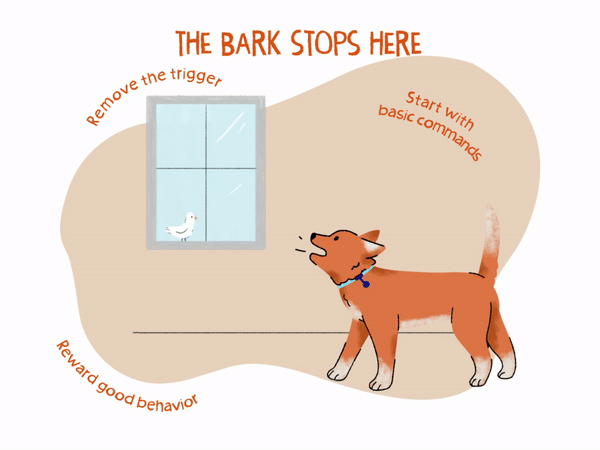Excessive dog barking can be addressed by identifying the underlying cause and implementing appropriate training techniques to curb the behavior. Dogs may bark excessively due to fear, boredom, territoriality, or a need for attention, among other reasons.
Understanding the root cause allows for targeted interventions, such as providing mental and physical stimulation, regular exercise, socialization, and positive reinforcement training. It can also help to enlist the support of a professional dog trainer or behaviorist to develop a tailored behavior modification plan.
By addressing the cause of excessive barking rather than simply trying to suppress it, you can effectively manage your dog’s vocalization and promote a calmer and happier environment for both you and your furry companion.

Credit: dogtime.com
Understanding Excessive Dog Barking
Excessive dog barking can be a frustrating issue for any dog owner. Not only can it disrupt the peace and quiet in your home, but it can also cause tension with neighbors or even result in complaints. Understanding the reasons behind your dog’s excessive barking is the first step towards finding a solution. By identifying the root causes, you can then implement effective strategies to reduce your dog’s vocalizations and bring peace back into your daily life.
Common Causes Of Excessive Dog Barking
There are various reasons why dogs bark excessively. It’s important to pinpoint the specific cause in order to address the issue effectively. Here are some common causes:
- Territorial Behavior: Dogs are naturally protective of their surroundings. When they perceive a threat or intruder, they may bark excessively to alert and defend their territory.
- Separation Anxiety: Dogs that experience separation anxiety may exhibit excessive barking when left alone. This is their way of expressing distress and seeking attention.
- Attention-Seeking: Some dogs bark excessively simply because they want attention from their owners. They have learned that barking is an effective way to get noticed.
- Boredom: Dogs that lack mental and physical stimulation may resort to excessive barking as a way to alleviate boredom and frustration.
- Fear or Anxiety: Dogs that are fearful or anxious may bark excessively as a response to perceived threats or stressful situations.
The Negative Effects Of Excessive Dog Barking
Excessive dog barking doesn’t only affect the dog owner but can also have negative consequences for the dog itself. Here are some of the negative effects:
- Stress and Anxiety: Dogs that bark excessively are often stressed and anxious, which can have a detrimental impact on their overall well-being.
- Strained Relationships: Excessive barking can create tension and strain in relationships, both within the household and with neighbors. It can lead to disputes and even legal problems if not addressed.
- Disturbed Sleep: For both the dog owner and surrounding households, excessive barking can disrupt sleep patterns, leading to fatigue and reduced quality of life.
- Health Issues: Excessive barking can cause physical strain on a dog’s vocal cords, leading to potential damage and voice disorders.
- Ongoing Behavior Problems: If excessive barking is left unaddressed, it can contribute to other behavior issues in dogs, such as aggression or compulsive behaviors.
Now that we understand the common causes and negative effects of excessive dog barking, it’s time to explore practical strategies to help manage and minimize this behavior. By implementing targeted training techniques and addressing the underlying triggers, you can restore peace and harmony in your home while ensuring your furry friend’s well-being.

Credit: www.akc.org
Addressing Excessive Dog Barking
Does your dog bark excessively? Discover effective strategies to address this issue and maintain a peaceful living environment for you and your furry friend.
Introductory Paragraph:
Excessive dog barking can be a frustrating issue for pet owners to deal with, causing stress and possible neighbor complaints. However, there are effective ways to address this problem and restore peace and quiet in your home. In this section, we will explore different strategies to tackle excessive barking, including identifying the underlying issue, positive reinforcement training techniques, using environmental enrichment, and seeking professional help.Identifying The Underlying Issue
Identifying the underlying cause of your dog’s excessive barking is the first step in finding a solution. Dogs may bark excessively due to loneliness, boredom, fear, separation anxiety, or seeking attention. By understanding the root cause, you can tailor your approach to address the specific issue.Positive Reinforcement Training Techniques
Positive reinforcement training techniques are a humane and effective approach to manage excessive barking. By rewarding your dog for desired behaviors and ignoring or redirecting their barking, you can teach them alternative ways to communicate. Here are some techniques to consider:- Teach the “Quiet” command: By patiently teaching your dog the “Quiet” command using treats and praise, you can encourage them to stop barking on command.
- Distraction with toys: Redirect your dog’s attention from barking by providing them with interactive toys or puzzles.
- Clicker training: Utilize a clicker to mark and reward your dog’s quiet moments, reinforcing positive behavior.
- Desensitization: Gradually exposing your dog to the triggers that cause excessive barking, in a controlled and positive way, can help reduce their response over time.
Using Environmental Enrichment To Reduce Barking
Environmental enrichment plays a crucial role in keeping your dog engaged and mentally stimulated, helping to reduce excessive barking. Consider the following strategies:- Provide interactive toys: Interactive toys that dispense treats or require problem-solving can keep your dog occupied and minimize boredom.
- Regular exercise: Ensure your dog gets enough exercise to release pent-up energy, making them less likely to bark out of frustration or boredom.
- Rotate toys and activities: Keep your dog interested by rotating their toys and introducing new activities regularly.
- Background noise: Soothing background music or white noise can help mask external triggers and create a calming environment.
Seeking Professional Help
If your dog’s excessive barking persists despite your efforts, it may be time to seek professional help. A certified dog trainer or animal behaviorist can provide tailored advice and guidance based on your dog’s specific needs. They can help analyze the situation, develop a behavior modification plan, and teach you effective techniques to address excessive barking. Remember, addressing excessive barking requires patience, consistency, and understanding. By identifying the underlying issue, utilizing positive reinforcement training techniques, implementing environmental enrichment, and seeking professional help when necessary, you can help your dog become less vocal and enjoy a quieter living environment.Preventing Excessive Dog Barking
Excessive barking is one of the most common behavioral problems in dogs and can lead to frustration for both owners and neighbors. It is important to address this issue early on to prevent it from becoming a habit. By focusing on proper socialization and training, ensuring sufficient exercise and mental stimulation, and avoiding triggers for excessive barking, you can help your dog become less vocal and more content.
Proper Socialization And Training From An Early Age
Dogs are social animals and need to be exposed to various people, animals, and environments from a young age to prevent fear-based barking. Introducing your dog to different sights, sounds, and experiences helps to build their confidence and reduces the likelihood of excessive barking later on.
Using positive reinforcement methods, such as treats and praise, during training helps to create a bond between you and your dog, making them more receptive to learning commands and preventing barking inappropriately. Consistency is key, ensuring that everyone in the household is on the same page when it comes to training and reinforcing desired behaviors.
Ensuring Sufficient Exercise And Mental Stimulation
A tired dog is a well-behaved dog, and adequate exercise is crucial for preventing excessive barking. Engaging your dog in regular physical activities such as walks, runs, or playing fetch not only helps to burn off excess energy but also provides mental stimulation that can reduce boredom-related barking.
Mental stimulation is just as important as physical exercise in preventing excessive barking. Providing puzzle toys, interactive games, and training sessions that challenge your dog’s mind will help keep them mentally engaged and less likely to bark out of boredom or frustration.
Avoiding Triggers For Excessive Barking
Identifying and avoiding triggers that cause your dog to bark excessively is essential in preventing the behavior from escalating. Common triggers may include doorbells, other dogs, or loud noises. Take note of these triggers and limit your dog’s exposure to them to minimize the likelihood of excessive barking.
Creating a calming environment for your dog by providing a designated quiet space and using white noise machines or calming music can also help reduce stress and excessive barking. Additionally, consider introducing your dog to desensitization exercises, gradually exposing them to the triggers that usually set off their barking, while rewarding calm behavior.
By focusing on proper socialization and training, ensuring sufficient exercise and mental stimulation, and avoiding triggers for excessive barking, you can help your dog develop healthier and more appropriate ways of communicating, leading to a quieter and more harmonious household.

Credit: www.banfield.com
Alternative Solutions For Excessive Barking
Dogs communicate with us using various vocalizations, but excessive barking can become a nuisance for both you and your neighbors. Luckily, there are effective alternative solutions to help address this issue. In this article, we will explore three different approaches to tackle excessive barking: anti-barking devices and collars, natural remedies, and behavioral modification techniques. Let’s dive right in!
Anti-barking Devices And Collars
If you’re looking for a quick and efficient way to control your dog’s excessive barking, anti-barking devices and collars can be a game-changer. These devices work by emitting a sound, vibration, or mild static pulse when your dog barks excessively, deterring them from continuing this behavior. Here are some popular anti-barking devices and collars:
| Device/Collar | Description |
|---|---|
| Bark Collars | A collar that detects barking and automatically releases a corrective stimulus, such as a spray, vibration, or mild electric shock. |
| Ultrasonic Devices | Handheld or stationary devices that emit an ultrasonic sound when triggered by excessive barking, which is highly unpleasant for dogs. |
Natural Remedies For Barking
For those who prefer more natural approaches, there are several remedies you can try to minimize your dog’s excessive barking. These remedies can be used in combination with other techniques to enhance their effectiveness:
- Calming Herbs: Chamomile, passionflower, and valerian root have calming properties that can help reduce anxiety and control barking.
- Essential Oils: Lavender and chamomile essential oils, when diluted and used properly, can have a soothing effect on your dog’s nervous system.
- White Noise or Music: Playing soft instrumental music or white noise can help drown out external triggers that may cause your dog to bark excessively.
Behavioral Modification Techniques
Behavioral modification techniques focus on addressing the root causes of excessive barking. By understanding the triggers and using positive reinforcement, you can gradually change your dog’s behavior. Here are some techniques to consider:
- Counter-Conditioning: Training your dog to associate the triggers of excessive barking with positive experiences, such as treats or playtime.
- Distracting and Redirecting: Introduce toys, puzzles, or interactive games to redirect your dog’s attention when they start barking excessively.
- Professional Training: Seeking guidance from a professional dog trainer who can tailor a training program to address your dog’s unique behavior.
Remember, it’s important to be patient and consistent when implementing any of these alternative solutions. Understanding your dog’s needs and providing them with proper training and care will go a long way in curbing excessive barking.
Frequently Asked Questions For Excessive Dog Barking: What To Do When Your Dog Is Too Vocal
How Do I Stop My Dog From Being So Vocal?
To stop your dog from being vocal, start by identifying the cause of their barking. Provide plenty of exercise and mental stimulation to keep them calm. Use positive reinforcement techniques to train them to be quiet on command. Consult a professional dog trainer for guidance if needed.
How Do You Stop A Hyper Dog From Barking?
To stop a hyper dog from barking, provide mental and physical stimulation through regular exercise and playtime. Use positive reinforcement training techniques to teach them the “quiet” command. Redirect their attention with toys or puzzles when they start barking. Avoid punishing or shouting at them, as it may make the barking worse.
Remember consistency is key for successful training.
Can A Dog Lose Its Voice From Barking Too Much?
Yes, dogs can lose their voice from excessive barking. Continuous strain on the vocal cords may lead to laryngitis or temporary hoarseness. Monitoring and training can help prevent this issue, ensuring your dog’s vocal health.
Can You Do Anything About A Dog Constantly Barking?
To address a dog that barks constantly, effective techniques include identifying the underlying cause, providing proper exercise and mental stimulation, implementing positive reinforcement training, using distractions and deterrents, and seeking professional help if needed.
Conclusion
To put an end to excessive dog barking, it is crucial to understand the underlying causes and implement effective strategies. By addressing your dog’s boredom, providing ample exercise and mental stimulation, and utilizing positive reinforcement techniques, you can curb their vocal tendencies.
Remember, consistency and patience are key in training your furry companion. With these tips and a little perseverance, you can restore peace and quiet in your home.







